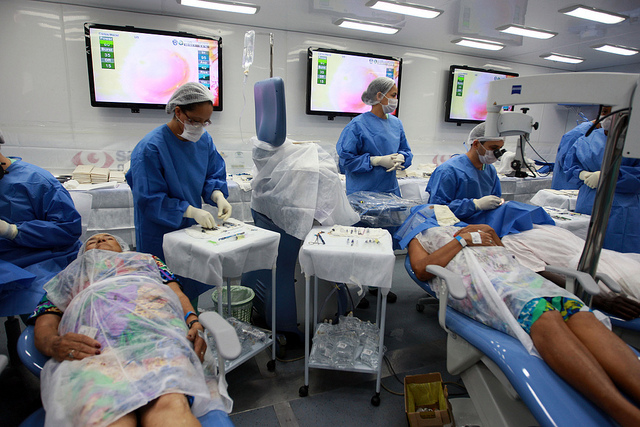<p style="text-align: justify;">The last thing on anyone’s mind when making a hospital visit is the possibility of contracting a hospital acquired infection (HAI). However, the CDC estimates that 1 out of every 20 hospitalized persons will contract an HAI. These infections are preventable, yet they are still one of the leading causes of death in the United States. Hospital acquired infections are also quite costly, with an annual average of up to $45 billion in added medical costs. Some of the most common of these infections include sepsis, pneumonia, MRSA, and surgical site infections.</p>
<p style="text-align: center;"><img class="aligncenter size-Correct wp-image-8603" alt="4 Dangers Lurking In Hospitals" src="https://medusamagazine.com/wp-content/uploads/2013/10/10405570883_28511a49bf_z-600x400.jpg" width="600" height="400" /></p>
<p style="text-align: center;">Image via Flickr by GOVBA</p>
<h2 style="text-align: justify;">Sepsis</h2>
<p style="text-align: justify;">Sepsis, more commonly known as a blood infection, is a condition where a severe infection has made its way into the body via the bloodstream. Bacteria is most commonly responsible for sepsis, although various types of viruses and infections in other parts of the body can aid in its development. Reports indicate that up to 20 percent of patients who develop sepsis after hospitalization will die as a result. There are two main factors that increase the risk for a sepsis infection. An already compromised immune system when you enter the hospital is one of these, due to the fact that a weakened immune system makes it difficult for your body to fend off dangerous bacteria. Improper sterilization techniques after surgery can also greatly add to the risk of infection. Staff, patients, and visitors following hospital procedures regarding proper sanitation techniques will aid in reducing the spread of sepsis.</p>
<h2 style="text-align: justify;"><b>Pneumonia</b></h2>
<p style="text-align: justify;">Hospital acquired pneumonia is the second most common hospital acquired infection. Nosocomial pneumonia is more severe due to the fact that patients already presented with a compromised immune system and bacteria picked up in hospital environments is more dangerous. These factors can make hospital acquired pneumonia more difficult to treat, with lung damage or death both being possible outcomes. This HAI can be spread from one person to another, with the bacteria being transferred via clothing or skin. Patients with a condition that requires them to be on a respirator for an extended period of time can also be at an increased risk for hospital acquired pneumonia. Reduce pneumonia risk by proper hand washing and adhering to all hospital policies regarding infection control.</p>
<h2 style="text-align: justify;">MRSA</h2>
<p style="text-align: justify;">MRSA is a type of infection that has been receiving quite a bit of news coverage recently. It is important to know that although there are various ways to contract the bacterial infection MRSA, it is most often contracted during hospital stays. The reason that this particular infection is so troublesome to healthcare professionals and members of the public alike is that the infection is resistant to antibiotics and most individuals who have contracted it were already dealing with a compromised immune system when they first entered the hospital. In 2011, there were approximately 80,000 hospital acquired MRSA infections in the US alone. MRSA can be fatal, with the CDC estimating an annual average of 5,500 deaths directly attributed to the infection. However, proper sanitation techniques such as washing hands can help to prevent its transmission.</p>
<h2 style="text-align: justify;">Surgical Site Infection</h2>
<p style="text-align: justify;">Surgical site infections, or SSIs, are infections that occur at the site of a surgery. They can be superficial, involving only the skin, or deep which is under the skin and involving the organs or surgical implants. Signs of surgical site infections include fever, swelling, and redness. It is estimated that up to 3 percent of Americans develop surgical site infections annually. These patients are two times more likely to die as a result of their infection. Risk factors that increase the chances of surgical site infections include smoking, and shaving the surgical site with a razor. Proper hand hygiene and reporting any symptoms to a doctor immediately after onset are both ways to mitigate the risk of surgical site infections.</p>
<p style="text-align: justify;">Hospital acquired infections are a very real risk that the average person does not usually consider upon being admitted for routine procedures. However, there are methods to reduce the chance of infection. Practicing proper hand hygiene is essential to minimizing the risk of hospital acquired infections. When hospitalized request that all doctors, nurses, and visitors wash their hands in front of you. If a friend or family member wishes to visit you but is presenting symptoms of illness tell them to stay home. While their sentiment is much appreciated, the potential spread of illness to already immuno-compromised patients is not. Most importantly, all hospitals have policies and procedures for infection control. It’s important to follow these guidelines to reduce the risk of contracting and spreading hospital acquired infections.</p>

4 Dangers Lurking In Hospitals
